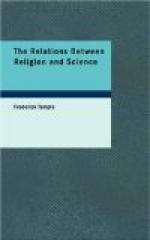The martyrdom of our Lord’s disciples is enough to prove that belief in His supernatural powers and in His exercise of those powers was no gradual growth of later times, but from the very beginning rooted in the convictions of those who must have known the truth. The character of our Lord as revealed in the Gospels makes it impossible to disbelieve His claims whatever they may be. His power attested by generations of believers ever since corroborates those claims by the persistent evidence of eighteen centuries.
Against this evidence what is to be said?
It is said that the evidence for the uniformity of nature is so overwhelming that nothing can set it aside. And further it is said, that, even if it be conceded that it might be set aside, no evidence sufficient for the purpose has yet been produced.
Now to deal with this second assertion first, we must ask what is the nature of the evidence that would be deemed sufficient? If the inquirer does not believe that God created and still governs the world, assuredly no evidence will ever be sufficient to convince him that God has worked a miracle. The existence of God is certainly not to be proved by His interference with nature. Had He desired to reveal Himself to us primarily in that way, He would have wrought many more miracles than we now know of, and would have kept our faith alive by perpetual and unmistakeable manifestations of His presence and power. But He has not so willed. He has made our belief in Him rest mainly on the voice within ourselves, in order that we might walk by faith and not by sight. It will be a hopeless task to convince men that there is a God by pointing, not to His creation but to His interference with creation. But if a man do believe there is a God, what kind of evidence ought he to expect to show him that God has interfered in the course of the creation?
In the first place, he must not expect that the physical evidence, that is the miraculous evidence, for Revelation should be of such a character as to stand above the spiritual evidence. Just as the fundamental evidence for the existence of a God is to be found in the voice of conscience, and the arguments from design and from the order and beauty and visible purpose of the creation are secondary—corroborative not demonstrative—so too the primary evidence of a Revelation from God must be found in the harmony of that Revelation with the voice of conscience, and only the secondary and corroborative evidence is to be looked for in miracles. And in both cases the reason is the same. For it is not God’s purpose to win the intellectually gifted, the wise, the cultivated, the clever, but to win the spiritually gifted, the humble, the tender-hearted, the souls that are discontented with their own shortcomings, the souls that have a capacity for finding happiness in self-sacrifice. It would defeat the purpose of the Revelation made to us if the hard-headed should have an advantage in accepting it over the humble-minded. The evidence must be such that spiritual character shall be an element in the acceptance of it. There would be a contradiction, if the faculty whereby we mainly recognised God were the spiritual faculty, and the faculty whereby we mainly recognised His Revelation were the scientific faculty.




